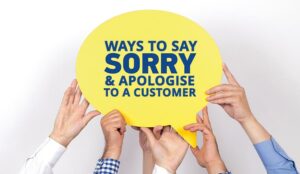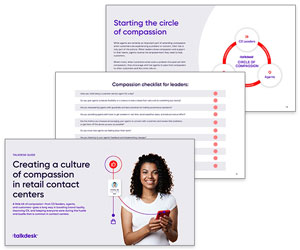In this day and age, where processes are automated up to the gills and there is precious little human involvement between consumers and companies, when something goes wrong, it requires even more effort to retain that customer for longer. Why is it then, that so many companies I speak to discourage the words “I’m sorry”.
Here’s a little story. Some time ago, my wife and I arranged for our store card to take out a certain amount the following month. They said “no problem”. Then, while looking through our bank statement, we discovered that the store in question had taken out the whole amount owed. Well, my wife was straight on the phone. The girl at the other end understood the problem, saw where it went wrong, and even refunded the money plus £30, but chose to omit two little words. These two little words represent a degree of ownership and accountability, which is desperately missing in the contact centres of today.
Say I’m sorry
It’s like they’ve been removed from the agent’s vocabulary! I find it hypocritical that in one breath, companies thump the table and demand the business takes a stronger approach to ownership and being accountable when things go wrong, yet refuse to adjust these small message changes at the sharp end.
So, from an emotional standpoint, being able to say sorry helps to build a stronger customer relationship. I’m a strong advocate of taking advantage of these “moments of truth”. This is when a company truly demonstrates the value it possesses to its customers. It is the formula for creating longer-lasting customers and more delighted ones as well.
Rather walk out than say I’m sorry?
So, how about your agents? How are you going to coach them on it? I can tell you from experience that I have seen agents threaten to walk out of the job rather than apologise to a customer. Once again, it is a problem with ownership. You can understand the position of the agent, why apologise for something that was not directly his or her fault? The way to win these people is simply to turn over their way of thinking. It’s not about them personally. The agent needs to see things from the customer’s perspective. If they were involved in a mistake, how would they like to be treated? What if the person involved was their child or partner? Wouldn’t they insist on an apology?
A complaint is a gift
The new way of thinking is that a complaint is a very important piece of feedback and it should be treated as such by your company.
Top tips for complaint handling
1. Establish a philosophy or ethos for the operation. An example of this is: “We believe that each customer that complains is giving us an opportunity to make things right. That they have enough faith in our company to help them resolve their problem, regardless of who is at fault. We also take the attitude that customers are giving us feedback on our product or service that we may have overlooked. If we incorporate this feedback into our approach, we will be better able to meet their needs and thereby be more successful in our venture.”
2. Thank the customer for the complaint and qualify it by saying something about how hearing the complaint will allow you to better address the problem. “Thank you for telling me, I’m pleased you told me so I can fix this for you” … or simply, “Thank you for letting me know”. Explain to the customer why you appreciate the complaint.
3. Do not immediately apologise, and when you do apologise, use the word “I” rather than “We”.
4. Do not use the words “but” and “however” in your conversation with the customer.
5. Ask the customer what it will take to meet their needs or to satisfy them. Or ask them if they will be satisfied if you do the specific thing for them that is related to their problem. Sometimes they only want to let you know something happened; they don’t necessarily want anything from you.
6. Do not say “I need to check that with a manager” to the caller. It immediately neuters the agent in the caller’s eyes. If the agent does have to check with a manager, politely place the caller on hold.
7. Promise to do something about it quickly. Give the caller your name and an extension (this gives the customer a feeling of control). Give an air of urgency to the call. Rapid responses say you are serious about service recovery to the customer.
8. Correct the mistake as quickly as possible. Research has proven that the sooner a complaint is resolved with the customer the greater the satisfaction and the more likely the customer will remain buying from you.
9. Check customer satisfaction. This can take the form of a very short customer satisfaction survey.

Gene Reynolds is a Director at Blackchair.
Author: Jo Robinson
Published On: 2nd Jul 2008 - Last modified: 6th Jul 2017
Read more about - Call Centre Management, Call Handling, Complaints, Empathy, Handling Customers, Language

















It may be something to do with the old, insurance thing where you should not say sorry as they felt that it would admit some for of liability.
I think that it has done a lot of harm.
This is so useful. Thank you
too much to say..but our voice is everything indeed..if we are sincere it will show in our voice.I will not say sorry because it’s my fault but for the inconvenience caused. Which is unfortunate sometimes inevitable and has happened, move on and resolve the issue at hand. Unless it is my fault then it comes out readily.
i believe that being to polite sometime agitate’s the customers as were a are only trying to help but sometime the customers feels like were are treating them like a little kid baby,which i think that sometimes being no so polite sometimes help us make the customers understand
what were are trying to do something for them NOT JUST SOME TELEPHONE OPERATOR.
do agree the magic word can make a diffence to change the irate situation, but not too much of it, it does not work on certain customers. it has to be followed by action on how to improve the situation with “no recurrence.”
SORRY!APOLIGISE! will be the 1st word to come frm the cs if anything goes wrong…the fact its not the cs’s mistake…but to overcome the situation this will be the golden word to make the cust delight eventhough they still not satisfy!nowdays i prefer to use “i’m regret” rather than “i’m sorry”!feel better!
as human i belief everyone shld have the nature to being polite..but feel sorry for those cust who know to call and just blast out without any courtesy! SORRY FOR THEM!
I agree of what Kavi said, being sorry is just not good enough to calm an irate customer. Giving the right solution is more critical in these situations.
Yes, to say “sorry” sometimes can be a very powerful “magic word” to calm down the customer from his or her frustration. But that is not enough, the customer want to know what can be done next & what we will do next to assist them to resolve their issue… They need a solution.
A complaint is a gift… No one as a customer service representative like to receive complaint from customer, because it will defect our performance.
To say “complaint is a very important piece of feedback from customer”… is just another “polite” or indirect way (of warning) – to alert us do not repeat the same mistake twice.
i do agree we the powerful “magic word” no matter in what situations we need to say it before giving any explanations or solutions for the customer if it is our fault. By the ‘magic word” itself is not good enough to calm their dissactisfactions, they expect our actions to follow up and promisses to show that we care.
You guys should look at it from the viewpoint of service personnel. I mean, handling customers every day, with at least one of them being rude and thinking that you owe them your life, it definitely SUCKS to be us. And even now, there’s the issue of SORRY? Are you kidding me? I always say sorry, if there is a problem that I can’t solve and I have to refer to tech staff.But that’s beside the point. I mean, saying sorry to a person who’s screaming and/or being sarcastic and/or insulting you… Please.
Getting the right solution is what you want, and now you want MORE? And you want to make a deal out of two words? Humans are NEVER happy with what they have.
I mean, we’ll solve your problems, and be polite too, but that does not mean that we’re going to lick your boots. As a whole, customers are never fully happy unless they come expecting something simple. Understand that we’re still human, understand that its our job to help you, and we’ll do it, but do understand that we’re all human and have emotions.
I agree entirely :s
hi thanks for the message. please help;any diffrence between “i’m sorry for…” and “i apologise for …”?